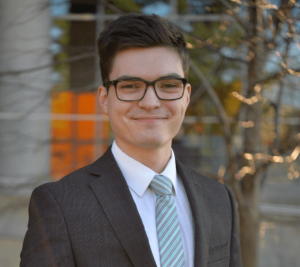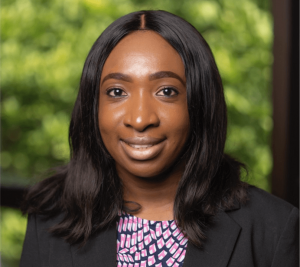By Lacie C. Blankenship
In early November, the Turner Family Center for Social Ventures (TFC) hosted the OnCampus Qualifiers for the 2023 Hult Prize Competition. The Hult Prize is an annual competition that challenges young people to solve global issues through social entrepreneurship. Over a year, competitors develop and pitch their social venture for a chance to win $1M in funding.
The 2023 challenge is ‘Redesigning Fashion’ to make clothes more sustainable. According to the Hult Prize website,the fashion industry is responsible for up to 8% of the world’s greenhouse gas emissions, consumes 215 trillion liters of water a year, and accounts for 9% of the microplastics found in our oceans. For the majority of workers, conditions are dangerous and exploitative.

Parker Willmon
“My favorite part of the Competition is listening to the pitches and hearing the different ideas,” says Parker Willmon (EngD’25), Hult Prize Vanderbilt Campus Director and TFC Social Startups Chair. “It is interesting to hear ideas that are not something I ever would have come up with, or that seem kind of weird, these pitches are the kind of thing where people can say crazy things and actually defend it.”
“This year’s challenge is especially interesting because it pertains to the fashion industry and pretty much every one of us is a part of the problem with sustainability issues in this industry,” says Chinenye Okafor (MBA’24).
The team that won the November Qualifier at Vanderbilt pitched the concept of dog fur as a more sustainable medium for clothing production. The team consisted of Emerson Pereira (BS’25), Zoe Sophia Potter (BA’25), Owen Andreas (BS’25), and Ella Nordlie (BASc’25).
The judges were Barrett Ward, CEO of Able, a Nashville-born lifestyle brand focused on ending generational poverty by providing economic opportunity for women; Jaclyn Mothupi, Associate Director of Social Innovation at the Wond’ry; and Corbin Hooker (BA’18), CEO of Resera, an ethical jewelry brand that employs and empowers women survivors overcoming homelessness, domestic violence, incarceration, and addiction.
Students of all disciplines are invited to participate in the Hult Prize Competition. The Vanderbilt OnCampus Qualifier included representation from the College of Arts and Sciences, Vanderbilt Owen Graduate School of Management, the Divinity School, the Department of Public Health, and Peabody College of Education and Human Development.
“Part of my role with the TFC and Hult Prize is to make students feel capable of launching their own business,” says Willmon. “By the end of the year, the students will have had the opportunity to come up with an idea and received mentorship.”
The Qualifiers are one of 2 ways students can get involved in the Hult Prize Competition (the second being a separate application process). After the Qualifiers/application process, 3,000 teams move forward to the Quarterfinals in March, held in 8 different cities. From there, 900 teams are invited to the Hult Prize Summits (Semifinals), held in 12 different cities. Winners from each summit and each summit’s ‘2nd chance round’ progress to the Global Accelerator step. Six finalists from the Global Accelerator step advance to the Global Finals in Paris for a chance to win the Hult Prize of $1M.

Chinenye Okafor
Beyond facilitating the OnCampus Qualifier, the TFC plans workshops and connects competitors to industry experts that can help improve their pitches. The TFC also awarded the winning teammates $1,000 each in travel funds.
“Participating in the Hult Competition gave me the opportunity to network with students outside of Owen that are in the Vanderbilt community,” says Okafor. “It was also great to see other ideas and learn from other presentations, and consider things we might have missed out in ours.”
To read the TFC blog on Hult at Vanderbilt, click here.